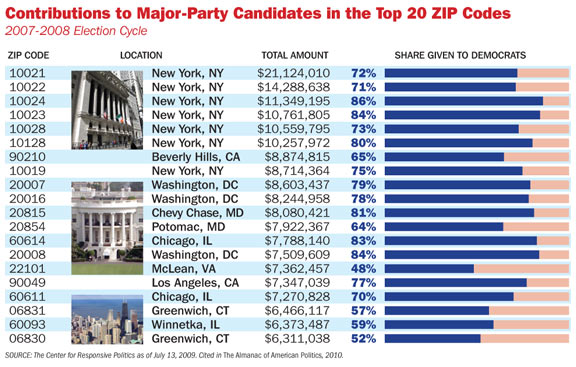In the Weekly Standard, Christopher Caldwell adopts the populist lefty position on financial reform (break up the banks, sow their smoking ruins with salt, and if they fail again just let them die) and then wonders why Republicans are fighting this. Is it because they’re the party of the rich? That’s surprisingly unclear. Exit polls show that, with the exeption of the most recent election, the moderately well-off (those with $200,000+ incomes) have voted pretty reliably for Republicans for decades, and Andrew Gelman has shown that this pattern is especially pronounced in poor states. But the really rich seem to support Democrats in pretty sizeable numbers. This chart shows the pattern of political contributions in the richest zip codes in America:

Now, this isn’t bulletproof evidence of who the really rich support. Apparently there isn’t any. But it’s pretty suggestive. And Caldwell is disgusted with the conclusion he draws:
Republicans have been paying a high price in both public opinion and political coherence to defend the prerogatives of a class that despises them. It was to cosset just these people with tax cuts that George W. Bush destroyed the balanced budget. It would seem that Republicans are either an exceptionally idealistic political party (pursuing their ideology to the point of self-destruction) or an exceptionally foolish one (convinced that anyone with a great big pile of money is their friend). There may be another explanation. To paraphrase something Clinton aide David Dreyer said many years ago, Republicans have done Lord Acton one better — they’ve been corrupted by power they don’t even have.
There’s actually an interesting question here: why do Republicans support the preferred policies of the rich so reliably, when that support isn’t reciprocated? I can think of a few possibilities:
- Inertia. The rich did support Republicans in the past and old habits die hard. Although party leaders seem to understand that ever since Nixon their base has been primarily among the white working class, they still haven’t really internalized what this means. So they just keep on supporting the rich.
- Why not? Republicans appeal to the working class mainly via social policies. So even if it won’t get them overwhelming support, why not get whatever support they can from the rich by supporting economic policies they like?
- Coincidence. The GOP is the party of big business, and the interests of big business mostly coincide with the interests of the rich.
- Bad data. Actually, the rich do support Republicans more than Democrats. The top 20 zip codes are heavily urban and Jewish, which are traditional Democratic constituencies, so this isn’t good evidence of their overall habits. A better survey of the rich might show that, in fact, they support Republicans pretty heavily.
- Something else I haven’t thought of. That should cover all the remaining possibilities.
Vote in comments!

















